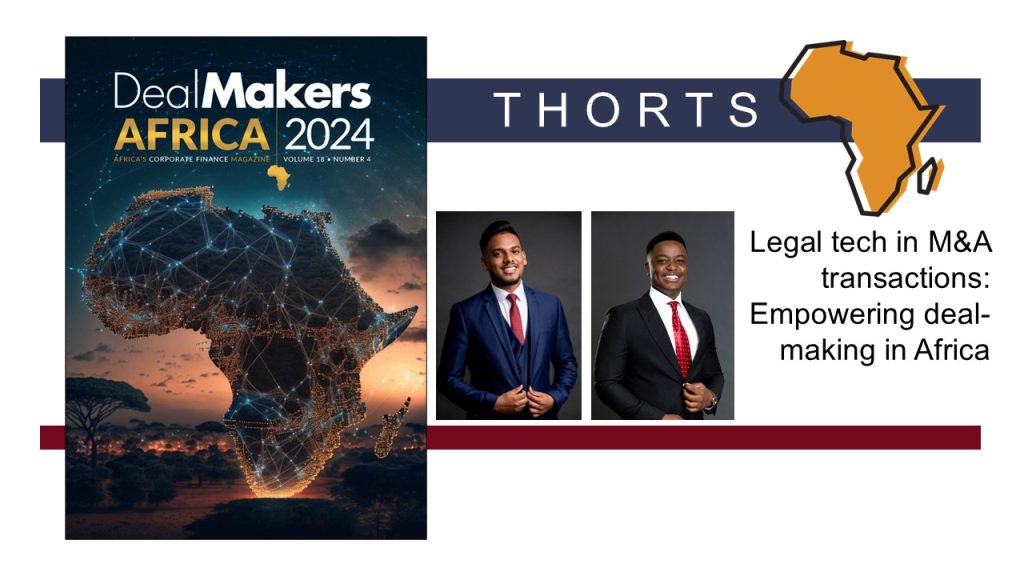Mergers and acquisitions (M&A) in Africa have traditionally presented complex challenges, including intricate regulatory landscapes, extensive due diligence requirements, and the need to navigate diverse legal systems. For foreign investors seeking opportunities within Africa’s expanding markets, these complexities have often resulted in increased costs, prolonged timelines, and heightened risks. However, the advent of legal technology is transforming M&A transactions across the continent, introducing efficiencies that mitigate these challenges and foster a more streamlined deal-making process.
From due diligence to post-transaction integration, legal technology is revolutionising core stages of M&A transactions, offering tools that enhance accuracy, reduce human error, and improve decision-making for stakeholders.
REVOLUTIONISING DUE DILIGENCE
Due diligence is one of the most critical phases of any M&A transaction, providing the foundation for informed decision-making. Historically, legal teams would manually review extensive documentation over several weeks or months, a time-consuming process susceptible to human error. Today, artificial intelligence (AI)-powered tools, employed by leading law firms such as DLA Piper, are automating this process with remarkable efficiency.
These tools leverage machine learning algorithms to review voluminous datasets, identify risks, and highlight key information in a fraction of the time required for manual analysis. By automating repetitive tasks, these technologies ensure comprehensive and accurate due diligence, enabling foreign investors to better assess potential risks and opportunities. This is particularly advantageous in Africa, where access to reliable data can be inconsistent.
STREAMLINING CONTRACT NEGOTIATION AND REVIEW
Contract negotiation and review are central to M&A transactions, which require meticulous scrutiny to ensure alignment with legal requirements and the interests of all parties. Legal technology now plays a pivotal role in this area, utilising AI-driven tools to analyse contracts, identify critical clauses, and detect discrepancies or risks.
These platforms not only expedite the contract review process but also assist legal professionals by suggesting edits and ensuring compliance with local laws and regulations. In Africa’s diverse legal environment, such tools are invaluable for tailoring contracts to address jurisdiction-specific challenges. Consequently, investors can approach transactions with greater confidence, knowing that agreements are both legally sound and strategically advantageous.
OPTIMISING DEAL STRUCTURING AND INTEGRATION
The structuring of M&A transactions often involves balancing complex considerations, including regulatory compliance, financial implications, and strategic goals.
Legal technology facilitates this process through predictive analytics and data-driven insights, allowing negotiators to evaluate various deal structures and simulate potential outcomes.
For transactions within Africa, where regulatory requirements can vary significantly between jurisdictions, these tools are instrumental in ensuring compliance and reducing the risk of post-transaction complications. Furthermore, legal technology supports post-deal integration by managing data, streamlining communication, and providing project tracking capabilities, thereby enhancing operational efficiency and long-term success.
ETHICAL CONSIDERATIONS AND EMERGING RISKS
While legal technology offers significant benefits, it raises ethical concerns, particularly around data privacy and AI reliability. AI tools rely on vast datasets, often containing sensitive financial and personal information, increasing the risk of data breaches. In Africa, where data protection laws are still evolving, companies must ensure compliance with local and international standards.
The reliability of AI-generated outputs depends on the quality of training data. Biases or inaccuracies can lead to misleading results, as seen in Mavundla v MEC: Department of Co-Operative Government and Traditional Affairs KwaZulu-Natal and Others (2025). In this case, a law firm faced scrutiny for citing fictitious case law, potentially AI-generated. The court dismissed the appeal after finding most references were non-existent, highlighting the need for rigorous oversight.
AI also has financial and environmental costs. Training large models requires vast computational resources, contributing to carbon emissions. The recent release of DeepSeek by China has intensified market competition, raising concerns about AI’s sustainability. Legal professionals must balance AI’s efficiencies with its ethical and environmental risks, ensuring it enhances rather than undermines legal integrity.
THE REGULATORY LANDSCAPE FOR AI IN AFRICA
As the adoption of AI accelerates, several African countries are developing frameworks to regulate its use. While no jurisdiction has enacted AI-specific legislation as of January 2025, notable advancements have been made:
- Egypt: Released the Second Edition of its National Artificial Intelligence Strategy 2025–2030 in January 2025.
- Ghana: Published the National Artificial Intelligence Strategy 2023–2033 in October 2022.
- Kenya: Unveiled the Kenya National Artificial Intelligence Strategy 2025–2030 in January 2025.
- Nigeria: Introduced a draft National Artificial Intelligence Strategy in August 2024.
- South Africa: Released the National Artificial Intelligence Policy Framework in August 2024, emphasising ethical AI use, personal information protection, and enhanced government efficiency.
These initiatives reflect a growing recognition of AI’s transformative potential, coupled with the necessity of safeguarding ethical standards and data privacy.
The integration of legal technology into M&A transactions is reshaping the African deal-making landscape, offering tools that enhance efficiency, reduce risks, and ensure more successful outcomes. By automating labour-intensive processes such as due diligence, matter management, and contract review, and by providing actionable insights for deal structuring and post-transaction integration, legal technology is enabling investors and legal professionals to navigate the complexities of African markets with greater confidence.
Nevertheless, the adoption of these technologies must be approached with caution. The Mavundla case serves as a stark reminder of the potential pitfalls of uncritical reliance on AI, underscoring the need for human oversight and ethical diligence. As Africa continues to refine its regulatory frameworks for AI, legal practitioners must strike a balance between embracing innovation and safeguarding the principles of accountability and professionalism that underpin the legal profession.
Tevin Ramalu is an Associate Designate and Lemont Shondlani a Candidate Legal Practitioner in the Corporate Department. Supervised by Amy Eliason, a Director | DLA Piper Advisory Services

This article first appeared in DealMakers AFRICA, the continent’s quarterly M&A publication.
DealMakers AFRICA is a quarterly M&A publication
www.dealmakersafrica.com



